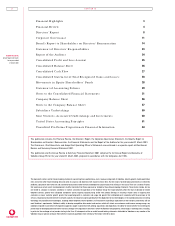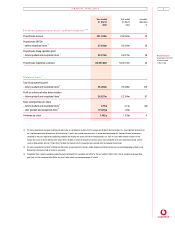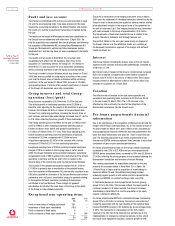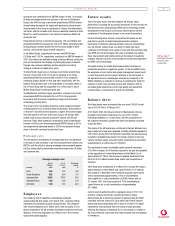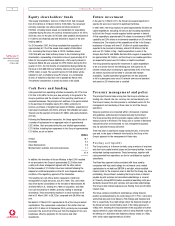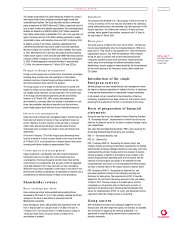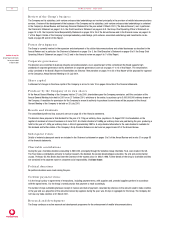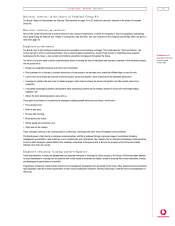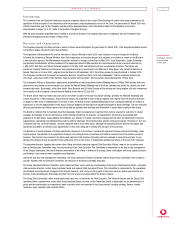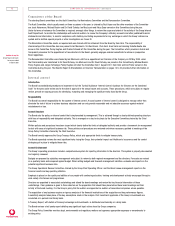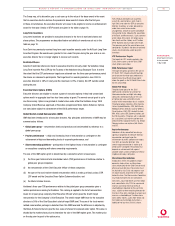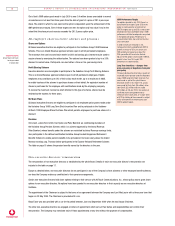Vodafone 2001 Annual Report Download - page 13
Download and view the complete annual report
Please find page 13 of the 2001 Vodafone annual report below. You can navigate through the pages in the report by either clicking on the pages listed below, or by using the keyword search tool below to find specific information within the annual report.
Vodafone Group Plc
Annual Report & Accounts
for the year ended
31 March 2001
11
CORPORATE GOVERNANCE
In tr od uction
The Combined Code on Corporate Governance requires companies listed on the London Stock Exchange to make a disclosure statement on its
application of the principles of and compliance with the provisions of good governance set out in the Code. The year ended 31 March 2001 was
another momentous year for the Company and the matters described below, and in the Board’s Report to Shareholders on Directors’
Remuneration on pages 14 to 22, relate to the position throughout the year.
With the minor exception explained below, relating to training for directors, the Company has been in compliance with the Combined Code
provisions throughout the year ended 31 March 2001.
Directors an d Organ isation
The Company presently has fifteen directors, eleven of whom served throughout the year ended 31 March 2001. Their biographical details are set
out briefly on pages 28 and 29 of the Annual Review.
The acquisition of Mannesmann AG and the formation of Verizon Wireless in April 2000, have resulted in a year of change for the Board.
Following the formation of Verizon Wireless, Arun Sarin resigned as an executive director but accepted an invitation to remain on the Board in
a non-executive capacity. The Mannesmann acquisition resulted in changes to the Board in May 2000. Josef Ackermann, Jürgen Schrempp
and Henning Schulte-Noelle, all then members of the Supervisory Board of Mannesmann AG, were appointed as non-executive directors on
1 May 2000. Sam Ginn and Charles Schwab resigned on 23 May 2000 and Ian MacLaurin was re-appointed Chairman. Paul Hazen was
elected as a Deputy Chairman and the senior non-executive director in succession to Ian MacLaurin. Klaus Esser, who joined the Board as a
Deputy Chairman on 5 June 2000, resigned from the Board on 30 September 2000. Don Fisher decided to leave the Board in October 2000.
The Company considers all its present non-executive directors, except Arun Sarin, to be fully independent. The five executive directors are
Chris Gent, Julian Horn-Smith, Peter Bamford, Thomas Geitner and Ken Hydon. Thomas Geitner joined the Board on 15 May 2000.
The Company’s Articles of Association, approved by shareholders at the Extraordinary General Meeting held on 24 May 1999, provide that every
director who was elected or last re-elected at or before the Annual General Meeting held in the third calendar year before the current year shall
automatically retire. Accordingly, Julian Horn-Smith, Peter Bamford and Sir David Scholey will be retiring and, being eligible, will offer themselves
for re-election at the Company’s Annual General Meeting to be held on 25 July 2001.
The Board, which meets six times each year and on one other occasion in the year to consider strategy, provides the effective leadership and
control required for a listed company. Actual financial results are presented to each meeting, together with reports from the executive directors
in respect of their areas of responsibility. From time to time, the Board receives detailed presentations from non-Board members on matters of
significance or on new opportunities for the Group. Financial budgets and forecasts are regularly discussed at Board meetings. The non-executive
directors periodically visit different parts of the Group and are provided with briefings and information to assist them to perform their duties.
The Board is confident that its members have the knowledge, talent and experience to perform the functions required of a director of a listed
company. Accordingly, it has not introduced a formal training programme for directors. On appointment, all directors are provided with
guidance as to their duties, responsibilities and liabilities as a director of a public and listed company and also have the opportunity to discuss
organisational, operational and administrative matters with the Chairman, the Chief Executive and the Company Secretary. Provision A.1.6 of the
Combined Code has, for these reasons, not been complied with in its strictest sense, although the Company believes that the information and
assistance provided to all directors upon appointment is more than adequate to comply with the spirit of the provision.
The Board has a formal schedule of matters specifically reserved to it for decision, including the approval of Group commercial strategy, major
capital projects, the adoption of any significant change in accounting policies or practices and material contracts not in the ordinary course of
business. The directors have access to the advice and services of the Company Secretary and have resolved to ensure the provision, to any
director who believes it may be required in the furtherance of his or her duties, of independent professional advice at the cost of the Company.
The executive directors, together with certain other Group functional heads and regional Chief Executive Officers, meet on ten occasions each
year as the Executive Committee under the chairmanship of the Chief Executive. This Committee is responsible for the day-to-day management
of the Group’s businesses, the overall financial performance of the Group in fulfilment of strategy, plans and budgets and Group capital structure
and funding. It also reviews major acquisitions and disposals.
During the year two new management committees, the Group Operational Review Committee and the Group Policy Committee, were created to
oversee, together with the Executive Committee, the execution of the Board’s strategy and policy.
The Group Operational Review Committee, which meets ten times a year under the chairmanship of the Group Chief Operating Officer, comprises
other executive directors, certain Group functional heads and regional Chief Executive Officers. This Committee is responsible for the operational
performance and achievement of targets of the Group’s business, with a focus on the growth of non-voice services, global new products and
services, brand development, technology and other cost and revenue synergies within the Group’s regions.
The Group Policy Committee, which meets eight times each year, is chaired by the Chief Executive. The Financial Director and the Group Chief
Operating Officer, together with certain other Group functional heads, join him on the Committee, which is responsible for the determination of
policy and the monitoring of non-operational areas of activity which are important to the Group overall, including strategy, finance, human
resources, legal, regulatory and corporate affairs.



